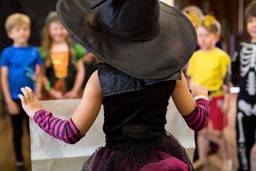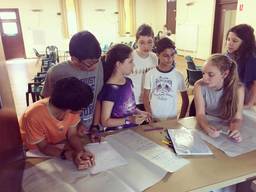What is the best age to learn public speaking?
In a world that’s rapidly embracing the power of communication, the ability to articulate thoughts clearly and persuasively is more crucial than ever. Public speaking, often thought of as a skill reserved for the confident few, is, in fact, a talent that can be nurtured from a young age. As parents and carers in Australia, it’s natural to wonder: what is the best age for kids to start learning public speaking?
 Beginning Public Speaking
Beginning Public Speaking
The Golden Window for Learning: Why Earlier is Often Better
The consensus among educators and communication experts is that there is no such thing as being too young to start learning the art of public speaking. From the moment children begin to form sentences, they're on their way to becoming communicators, capable of expressing their thoughts, needs, and desires. The journey from a child's first words to their first public speech is filled with opportunities for growth, learning, and confidence-building.
Research suggests that the early years, especially those between 5 to 8 years of age, are particularly potent for embedding public speaking skills. At this stage, children are naturally curious, less inhibited, and more open to learning new skills. Their brains are like sponges, readily absorbing information and adapting to new challenges. Starting public speaking lessons or drama classes during this period can have a profound impact on a child’s ability to communicate effectively throughout their life.
Drama classes offer a fun and engaging way for children to explore their expressive abilities. These classes encourage kids to step out of their comfort zones, use their imagination, and engage with their peers in a supportive environment. Drama activities not only improve children's verbal communication but also enhance their non-verbal skills, such as body language and facial expressions, which are equally important in public speaking.
Tailoring the Learning Experience: Adapting to Different Ages and Stages
While the early years are ideal for laying the foundation of public speaking skills, the journey doesn’t stop there. As children grow, their learning needs and capabilities evolve. Educational school holiday activities can play a significant role in continuing to develop these skills outside the traditional classroom setting. These activities often provide a more relaxed and fun environment, making learning feel less like a chore and more like an adventure.
For older children, especially those in their pre-teen and teenage years, public speaking and drama programs can be tailored to address more complex aspects of communication. This includes learning how to structure a speech, understanding the audience, and mastering the art of persuasion. These skills are not only valuable for public speaking but are also essential for academic success and future career opportunities.
It’s also worth noting that the journey to becoming an effective public speaker is unique for every child. Some may show an early interest and aptitude for speaking in front of others, while others may need more encouragement and practice. The key is to provide ongoing support and opportunities for practice, without putting undue pressure on the child. Celebrating small achievements and gradual progress is crucial in building confidence and motivation.
In the quest to equip our kids with the skills they need to navigate the world confidently, public speaking stands out as a critical tool. While the best age to start learning public speaking might vary from child to child, the underlying message is clear: the earlier, the better. Starting young takes advantage of children's natural adaptability and openness to learning. However, it’s the ongoing practice, encouragement, and the right educational opportunities, such as drama classes and school holiday activities, that will truly enable children to flourish as communicators.
For parents and carers ooking to foster these skills in their children, the array of options is vast. From drama classes that ignite the imagination to educational school holiday activities that challenge and engage, the opportunities for growth are endless. Remember, the goal is not to create a generation of professional speakers but to nurture confident individuals who can express themselves clearly and effectively in any situation. Whether your child is just starting to string sentences together or is navigating the complexities of adolescence, now is the perfect time to encourage them to raise their voice and share their thoughts with the world. Let’s give our children the gift of communication, and watch as they open doors to endless possibilities.
Quick Links
- Public speaking classes & lessons in Australia
- Public speaking classes & lessons in Adelaide
- Public speaking classes & lessons in Brisbane
- Public speaking classes & lessons in Inner North
- Public speaking classes & lessons in Hobart & South East
- Public speaking classes & lessons in Melbourne
- Public speaking classes & lessons in Darwin
- Public speaking classes & lessons in Sydney
- Public speaking classes & lessons in Perth

